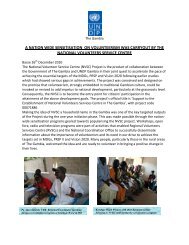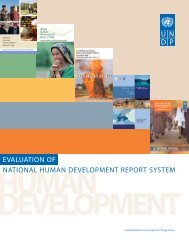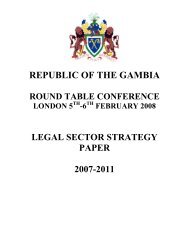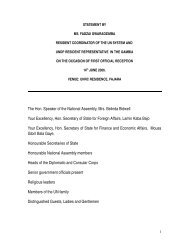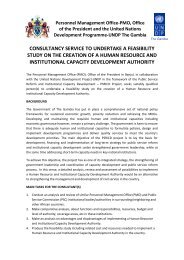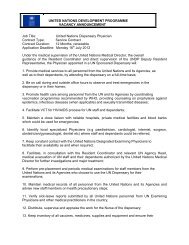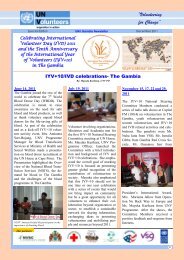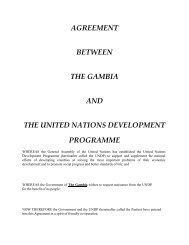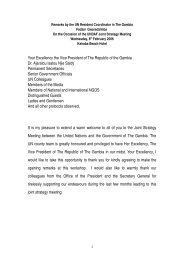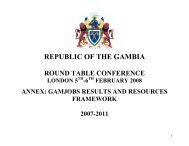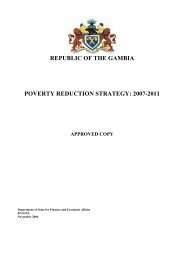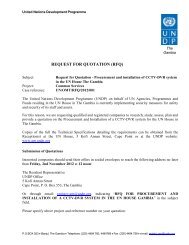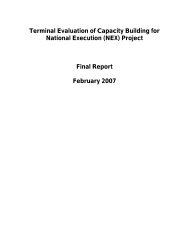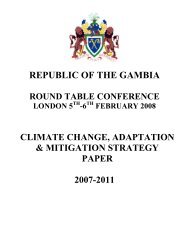Introduction - UNDP The Gambia
Introduction - UNDP The Gambia
Introduction - UNDP The Gambia
You also want an ePaper? Increase the reach of your titles
YUMPU automatically turns print PDFs into web optimized ePapers that Google loves.
________________________________________________________________________________________________________________________<br />
• inadequate information on<br />
disbursements provided to line<br />
departments of state during budget<br />
execution<br />
• proliferation of below-the-line accounts,<br />
which are generally not transparent, not<br />
accounted for or monitored by the<br />
Directorate of the Treasury<br />
• ineffectiveness of the Auditor-General’s<br />
Department.<br />
Public reporting on government effectiveness<br />
and efficiency is fundamental to good<br />
governance and accountability and sound<br />
public sector management. Allegations of<br />
fraud, embezzlement, theft, tampering of<br />
cheques and receipt books have on many<br />
occasions been established by the Auditor-<br />
General’s Department, leading to prosecution<br />
and dismissals.<br />
Unfortunately, the office currently faces<br />
severe constraints, which seriously reduce its<br />
impact and effectiveness. <strong>The</strong>se constraints<br />
include:<br />
• acute shortage of qualified professional<br />
staff<br />
• lack of material resources and equipment<br />
• late completion of audited accounts.<br />
<strong>The</strong> absence of good governance practices is<br />
the cause of many of the problems of the<br />
public service – problems impeding<br />
efficiency, productivity and progress.<br />
To address the weaknesses identified in the<br />
public service, <strong>The</strong> <strong>Gambia</strong> may seek to<br />
emulate recent measures adopted in the public<br />
services of Ghana and Uganda. In these<br />
countries, it is generally accepted that public<br />
services, like those in the private sector, are<br />
products to be tested against the needs of<br />
service users. This shift in emphasis has been<br />
encouraged by a conscious reshaping of the<br />
work culture to achieve customer<br />
orientation. Customer care training in<br />
comprehensive complaint procedures ensures<br />
that service users are seen as active, freely<br />
choosing customers rather than passive<br />
recipients of monopolistically provided state<br />
services.<br />
Civil service agencies in Ghana and Uganda<br />
no longer behave as self-serving bureaucrats<br />
who treat their customers, clients and<br />
stakeholders as secondary priorities. Public<br />
complaints units have been established in<br />
these countries since 1995 to ensure that<br />
services are customer-friendly and<br />
transparent.<br />
To address the weaknesses identified in the<br />
public service, <strong>The</strong> <strong>Gambia</strong> may seek to<br />
emulate recent measures adopted in the public<br />
services of Ghana and Uganda. In these<br />
countries, it is generally accepted that public<br />
services, like those in the private sector, are<br />
products to be tested against the needs of<br />
service users.<br />
For the past ten years reports, on the audited<br />
accounts of the public service have not been<br />
presented to the National Assembly, which<br />
violates the provisions of the Constitution.<br />
3 Good governance is open. <strong>The</strong><br />
business of Government should be open to<br />
scrutiny by the public and by the elected<br />
representatives. Public officials should<br />
explain their decisions and actions to the<br />
public and information about government<br />
business should be readily available. In the<br />
public service of <strong>The</strong> <strong>Gambia</strong>, information<br />
sharing with the public on the activities and<br />
business of Government is very limited; this<br />
has been a persistent complaint, even at the<br />
level of the National Assembly.<br />
In 1998, nine important Ghanian service<br />
delivery institutions (including the Passport<br />
Office, Land Title Registry, Registrar<br />
General’s Department) were assisted by the<br />
Office of the Head of the Civil Service<br />
(OHCS) of Ghana to develop standards for<br />
service delivery and printing brochures which<br />
explain their services to the public. <strong>The</strong><br />
brochures contain information about:<br />
• services provided by the institutions<br />
• procedures for making use of the<br />
services<br />
• standards of service to be expected by<br />
the public, eg procedures, costs and<br />
time scales for processing, registering<br />
and issuing various documents<br />
• procedures for making complaints.<br />
________________________________________________________________________________________________<br />
Building Capacity for the Attainment of the Millennium Development Goals in <strong>The</strong> <strong>Gambia</strong> National Human Development Report 2005<br />
15



